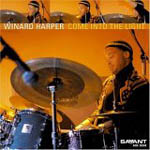Home » Jazz Articles » Album Review » Winard Harper: Come into the Light
Winard Harper: Come into the Light
Beginning with unheralded D.C. pianist Rueben Brown's "Float Like A Butterfly," the band displays its Jazz Messenger roots with Harper and Faye's polyrhythmic undercurrents propelling the horn solos that culminate in a hand drumming tour de force, leading into Sholar's AfroCuban statement which is followed by the leader's own dynamic solo and exchanges with the horns. Brown's original arrangement of Freddie Hubbard's "Little Sunflower" continues the Latin groove with Horton switching to soprano and Rickman to flugelhorn. Harper's "Divine Intervention" highlights his own considerable compositional skill in a fiery exposition reminiscent of Lee Morgan and Hubbard with an arrangement that features his melodic drum intervals.
Patton and Saleem both shine on a trio feature of Tadd Dameron's "If You Could See Me Now." Rickman's "911" begins darkly with a minor Middle Eastern melodic line and then charges straight ahead explosively. Patton's "T.F." is a bluesy dedication to the great Tommy Flanagan. Horton's "Specimen A" has the group settling into an easy groove that is continued on the relaxed reading of "Polka Dots and Moonbeams" and the medium tempo bounce of Freddie Green's swinging "Corner Pocket." Harper commences his composition "Come into the Light" with a solo balafon introduction that highlights the exotic melody. The concluding "Korinthis" by Saleem is an upbeat happy blues that gives everybody an opportunity to shine. Typically, Harper and company deliver throughout the kind of music that makes for a pleasant night out in a club. This disc lets listeners recreate that enjoyable experience at home.
Track Listing
Spoken Intro - Cecil Brooks III; Float Like a Butterfly; Little Sunflower; Divine Intervention; If You Could See Me Now; 911; T.F.; Specimen a; Polka Dots and Moonbeams; Corner Pocket; Come into the Light (Intro); Come into the Light; Korinthis.
Personnel
Winard Harper
drumsWinard Harper: Percussion, Drums, Balafon; Patrick Rickman: Trumpet; Alioune Faye: Djembe; Kelvin Sholar: Piano; Jeb Patton: Piano; Brian Horton: Soprano Sax, Tenor Sax.
Album information
Title: Come into the Light | Year Released: 2005 | Record Label: Savant Records
< Previous
Love Call
Next >
New Jersey Freylekhs
Comments
Tags
For the Love of Jazz
 All About Jazz has been a pillar of jazz since 1995, championing it as an art form and, more importantly, supporting the musicians who create it. Our enduring commitment has made "AAJ" one of the most culturally important websites of its kind, read by hundreds of thousands of fans, musicians and industry figures every month.
All About Jazz has been a pillar of jazz since 1995, championing it as an art form and, more importantly, supporting the musicians who create it. Our enduring commitment has made "AAJ" one of the most culturally important websites of its kind, read by hundreds of thousands of fans, musicians and industry figures every month.





















